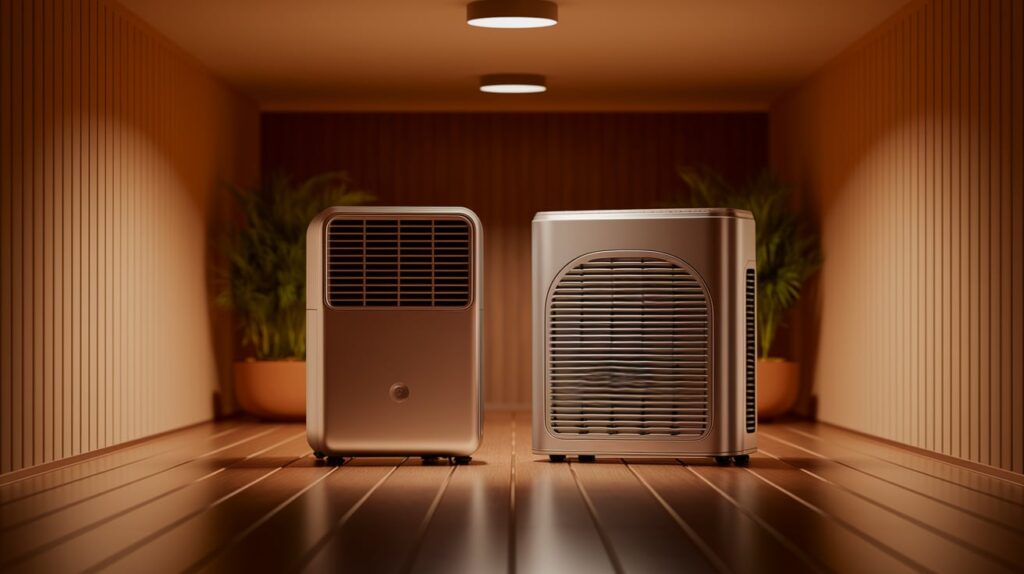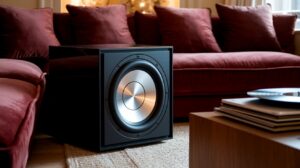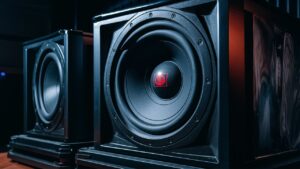Feeling frustrated with the damp, musty air lurking in your basement? You’re not alone.
Many homeowners grapple with this issue, and the solution often boils down to a choice between a dehumidifier and an air conditioner. But which one truly fits your needs? Both devices promise to enhance your basement’s environment, but they do so in different ways.
Making the right choice can transform your basement from a clammy, uncomfortable space into a cozy, welcoming extension of your home. Dive into this article to uncover the key differences, benefits, and potential drawbacks of each option. You’ll soon discover which device can best tackle your basement woes and bring you closer to the fresh, dry air you crave. Don’t miss out – your ideal solution is just a few scrolls away!

Purpose And Functionality
Dehumidifiers reduce moisture, preventing mold in basements. Air conditioners cool the space while also removing humidity. Each serves a distinct purpose, but both can improve air quality.
When deciding between a dehumidifier and an air conditioner for your basement, understanding their purpose and functionality is crucial. Both devices aim to improve air quality, but they do so in different ways. Knowing their roles can help you choose the best solution for your specific needs.
Dehumidifier Role
A dehumidifier is designed to remove excess moisture from the air. This is particularly useful in basements, which often suffer from dampness. By controlling humidity levels, dehumidifiers help prevent mold and mildew growth. Imagine walking into your basement and feeling a damp chill. A dehumidifier can make that space feel warmer and more comfortable. You might notice a difference in just a few days as the air becomes drier and fresher. Dehumidifiers are typically more energy-efficient than air conditioners. They focus solely on moisture removal without altering the temperature dramatically. This makes them a cost-effective option if your primary concern is reducing humidity.
Air Conditioner Role
An air conditioner, on the other hand, focuses on cooling the air. While it does remove some humidity, its main job is to lower the temperature. This can be beneficial if your basement gets too warm in the summer months. Consider a sweltering summer day when your basement feels like a sauna. An air conditioner can quickly turn that space into a cool retreat. It changes the environment by lowering the temperature, providing relief from the heat. However, air conditioners typically use more energy than dehumidifiers. They work harder to cool the air, which may lead to higher electricity bills. If cooling is your priority, an air conditioner might be the right choice, but it’s essential to weigh the energy costs. Which function is more important for your basement: reducing humidity or cooling? Understanding the primary role of each device can help you decide. Choose based on your specific needs and the climate challenges of your basement.
Energy Efficiency
When you’re working on maintaining a comfortable basement environment, energy efficiency is a key factor to consider. Choosing between a dehumidifier and an air conditioner can significantly impact your energy bills and overall comfort level. Understanding how each option uses energy can help you make the best choice for your space.
Dehumidifier Energy Use
Dehumidifiers are designed to remove moisture from the air, making them an excellent choice for basements prone to dampness. They typically consume less energy than air conditioners because they don’t need to cool the air. Imagine running a marathon in a full suit versus casual clothes; the latter is less taxing.
Most models operate efficiently at lower power levels, especially if you maintain them regularly. Clean filters and proper settings can enhance their performance. Consider setting your dehumidifier to run during peak humidity times for optimal energy use.
Air Conditioner Energy Use
Air conditioners provide cooling and dehumidification, which can be a bonus in hot and sticky climates. However, they generally use more energy than standalone dehumidifiers. Think of them as multitaskers that burn more calories—more tasks mean more energy.
Advanced models with energy-saving modes can help reduce consumption. If your basement feels like a sauna, an air conditioner might be necessary. Just be mindful of how often you run it and at what temperature settings.
Do you want a more efficient solution for your basement? Consider the specific climate and how often you’re in the basement. Energy efficiency isn’t just about saving money; it’s about choosing the right tool for the job.
Cost Considerations
Choosing between a dehumidifier and air conditioner for your basement involves cost considerations. Dehumidifiers are often cheaper to purchase and operate, focusing on moisture control. Air conditioners can be more expensive, offering cooling and humidity reduction. Evaluate energy efficiency and maintenance costs for each option.
When deciding between a dehumidifier and an air conditioner for your basement, understanding the cost implications is crucial. You want to choose an option that fits your budget while effectively managing your basement’s climate. This section will help you weigh the initial and operational costs of both appliances, offering insights to make a well-informed decision.
Initial Costs
The initial cost is the first expense you encounter when purchasing a dehumidifier or an air conditioner. Generally, dehumidifiers are less expensive upfront. You can find a decent unit for around $150 to $300, depending on the size and features you need. Air conditioners, particularly those designed for basements, tend to be pricier. A good-quality unit might set you back anywhere from $300 to over $1,000. If you’re considering a unit with heating capabilities, expect to pay more. But think about this: is a higher initial investment worth it if it means better temperature control? Consider your long-term needs before making a decision.
Operational Costs
Once you’ve purchased your appliance, operational costs come into play. Dehumidifiers are typically more energy-efficient, often using less electricity than air conditioners. They work by removing moisture, which can be less taxing on your power bill. On the other hand, air conditioners consume more energy. They not only dehumidify but also cool the air, which requires more power. If your basement tends to be cool, to begin with, an air conditioner might not be the most cost-effective choice. However, if you live in a hot climate, the cooling function could be beneficial. Balancing your comfort needs with your energy bill can be tricky, but worth the effort. Have you ever considered how much you’re willing to spend each month on maintaining your basement’s environment? Understanding these costs can help you choose the right appliance for your home. Incorporating both initial and operational costs into your decision-making process will guide you toward a choice that balances your financial limits with the comfort and functionality you desire in your basement.
Effectiveness In Basements
Basements often face challenges like dampness and poor air circulation. Choosing the right device can transform this space. Dehumidifiers and air conditioners both play roles. But which is more effective?
Moisture Control
Basements are prone to moisture due to their location underground. A dehumidifier directly targets this issue. It pulls excess moisture from the air. This reduces dampness and prevents mold growth. Air conditioners also remove some moisture. But their primary function is cooling. They might not be as effective in very humid spaces.
Temperature Control
Dehumidifiers primarily focus on moisture, not temperature. They can slightly warm the air. This is not their main function. Air conditioners excel in temperature control. They cool the basement, making it more comfortable. So, for cooler basements, air conditioners win. But they might not handle high humidity well.
Installation And Maintenance
Choosing between a dehumidifier and an air conditioner for your basement involves considering installation and maintenance. Both systems require setup and regular upkeep. Knowing what each entails helps in making an informed decision. Let’s explore how each system is installed and maintained.
Dehumidifier Setup
Dehumidifiers are usually easy to install. Simply plug them in and position them properly. Place the unit in a central location in the basement. Ensure the airflow is not obstructed. Drainage options vary. Some units have a built-in bucket. Others allow continuous drainage through a hose. Regularly clean the filters to maintain performance. Check the water collection area for mold.
Air Conditioner Setup
Installing an air conditioner in a basement is more complex. It often involves professional help. Central air systems require ductwork. This can be expensive and time-consuming. Window units need secure placement in a window. Portable units require venting through a window or wall. Routine maintenance is key. Clean or replace filters regularly. Ensure proper refrigerant levels. Check for leaks or blockages in the system.
Impact On Indoor Air Quality
Basements often struggle with poor air quality due to high humidity. This can lead to mold, mildew, and unpleasant odors. Choosing the right appliance can improve the air you breathe. Both dehumidifiers and air conditioners have benefits. Understanding these can help you make a better choice.
Dehumidifier Benefits
Dehumidifiers reduce moisture in the air. This makes the basement less hospitable for mold and dust mites. By lowering humidity, they create a healthier environment. You’ll notice fewer musty odors too. Dehumidifiers also prevent structural damage from excess moisture. They are energy-efficient and cost-effective. They require minimal maintenance. This makes them ideal for basements.
Air Conditioner Benefits
Air conditioners cool and dehumidify the air. They offer comfort during warmer months. By lowering temperature, they reduce humidity levels. This helps in controlling mold growth. Air conditioners also improve air circulation. This minimizes stale air in basements. Many units come with air filters. These filters trap dust and allergens. This leads to cleaner air and improved health.
Noise Levels
If you’ve ever spent time in a basement, you know how important it is to have a comfortable environment. One aspect that often goes unnoticed is the noise level of your appliances. Whether it’s a dehumidifier or an air conditioner, these machines can significantly affect your peace and quiet. Let’s dive into how they compare in terms of noise.
Dehumidifier Noise
Dehumidifiers tend to be quieter than air conditioners. Most modern models are designed to minimize noise, operating at a gentle hum. This is great if you’re using your basement as a living space.
However, noise levels can vary. Smaller, portable dehumidifiers might be noisier due to their compact design. Before purchasing, consider testing different models to find one that suits your noise tolerance.
Think about how much time you spend in your basement. If it’s your personal retreat, a quieter model can enhance your relaxation. You’ll appreciate a peaceful atmosphere when unwinding after a long day.
Air Conditioner Noise
Air conditioners generally produce more noise than dehumidifiers. They’re designed to cool larger spaces, which often requires more power and, consequently, more noise.
Some units have noise reduction features, but these might come at a higher price. If you’re sensitive to noise, investing in a quieter model might be worth it.
Consider where your air conditioner will be placed. If close to your relaxation area, the noise might be distracting. Can you imagine reading a book with the constant hum of an air conditioner in the background?
Ultimately, your choice depends on your priorities. Is noise a dealbreaker for you in your basement? Balancing comfort and quiet is key, so weigh your options carefully before making a decision.
Space Requirements
Choosing between a dehumidifier and an air conditioner for your basement involves considering space requirements. Dehumidifiers are compact, needing less space while efficiently controlling humidity. Air conditioners are larger, requiring more room but also cooling the area.
Choosing between a dehumidifier and an air conditioner for your basement can be tricky. One key factor to consider is how much space each device requires. The size and layout of your basement will play a big role in determining the most suitable option.
Dehumidifier Space Needs
A dehumidifier typically takes up less space than an air conditioner. You can find compact models that fit neatly into tight corners. This is ideal if your basement is already packed with stored items or has limited floor space. Many dehumidifiers are portable and easy to move around. This flexibility allows you to target specific damp areas. If your basement has a moldy corner, you can position the dehumidifier right there. You might wonder if a small dehumidifier can do the job. In many cases, especially in smaller basements, a compact unit can be surprisingly effective. Think about the moisture levels and size of your space to choose the right capacity.
Air Conditioner Space Needs
Air conditioners generally require more space. They often need a window or vent access, which can limit placement options in a basement. Consider the layout before deciding on an air conditioner. Some basements might not have windows, making installation tricky. In such cases, a mini-split system could be a solution, but it still demands wall space and installation efforts. Air conditioners can cool and slightly dehumidify the air, but they aren’t as focused on reducing moisture as dehumidifiers. If your primary goal is moisture control, ensure the AC unit’s capacity matches your basement’s needs.
Have you ever struggled with space constraints in your basement? Share your thoughts in the comments and let us know how you solved it!
Versatility And Multi-season Use
Basements benefit from dehumidifiers and air conditioners in different ways. Dehumidifiers reduce moisture, ideal for year-round use. Air conditioners cool the space but are mostly effective in hot seasons. Both options cater to specific needs for versatile comfort.
Understanding the versatility and multi-season use of dehumidifiers and air conditioners is crucial, especially for your basement. Basements often face unique challenges due to their underground position. Choosing the right device can make your space comfortable all year round.
Dehumidifier Versatility
Dehumidifiers are heroes in combating excessive moisture, especially during humid seasons. They can operate in the spring and summer months, keeping your basement dry and mold-free. Picture this: it’s a humid day, and yet your basement feels fresh and comfortable. These devices are not just for hot weather. In cooler months, they continue to control moisture, protecting your belongings from dampness. You might be surprised to learn that a dry basement can even feel warmer in winter. With adjustable settings, dehumidifiers let you control the humidity level to your preference. Have you ever thought about how a simple adjustment can make such a big difference?
Air Conditioner Versatility
Air conditioners also offer significant versatility, especially with models designed for basements. They provide cooling relief during hot summer days, making your basement a perfect retreat. Imagine escaping to a cool basement while the rest of your house swelters in the heat. Some air conditioners come with built-in dehumidification features. This means they can reduce humidity levels while cooling the air. Could this dual function be a game-changer for your basement? Many modern units offer programmable features, allowing you to set temperatures and timers. Isn’t it convenient to step into a perfectly cooled space without lifting a finger? Choosing between a dehumidifier and an air conditioner depends on your specific needs. Have you considered which device offers the versatility you need for your basement?
Frequently Asked Questions
How Does A Dehumidifier Work In A Basement?
A dehumidifier removes excess moisture from basement air. It uses a fan to draw humid air over cold coils. This process condenses water vapor, which is collected in a reservoir or drained away. By reducing humidity, it helps prevent mold, mildew, and musty odors in basements.
Can Air Conditioners Dehumidify Basements Effectively?
Air conditioners can dehumidify basements but are less efficient than dehumidifiers. They cool the air, which reduces humidity as a byproduct. However, their primary function is cooling, not dehumidification. For significant moisture issues, a dehumidifier is typically more effective and energy-efficient in basements.
Which Is Better For Mold Prevention?
Dehumidifiers are better for mold prevention in basements. They specifically target excess humidity, the main cause of mold growth. By maintaining optimal humidity levels, dehumidifiers effectively reduce mold risks. Air conditioners can help but are less effective for this purpose due to their cooling focus.
Do Air Conditioners Increase Basement Energy Costs?
Air conditioners can increase basement energy costs. They consume more energy when cooling and dehumidifying large spaces. Using an air conditioner for dehumidification alone may not be cost-effective. A dehumidifier is generally more energy-efficient for managing moisture in basements, keeping costs lower.
Conclusion
Choosing between a dehumidifier and an air conditioner for your basement depends on your needs. Dehumidifiers excel at moisture control, making them ideal for damp basements. They help prevent mold and mildew, creating a healthier environment. Air conditioners cool the space while also removing some humidity.
This dual function can be a better fit for warmer climates. Consider your basement’s specific conditions. Think about your budget and energy use. Both options have their advantages. Make sure to choose the one that best suits your home’s requirements.








